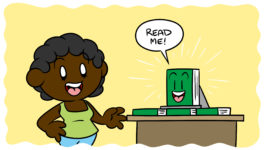Titles are intrinsic to a book’s identity – it’s almost impossible to talk about a work without giving it a name – so it can be jarring to realize that, in most cases, they’re the last thing to be added. Of course, that doesn’t mean you can’t do things differently, and there are good arguments for choosing your title at different times in the writing process.
In this article, I’ll be taking a look at a few of them, with a particular focus on the benefits of choosing early. Before that, however, let’s get the most common choice out of the way.
Choosing a title once the book is finished
The most common choice in titling – and the best advice for most authors – is to pick a title once the book is completed. There are a lot of reasons to do this, but the most obvious is that it makes far more sense for the title to sell the book than for the book to answer to the title. The title, like the blurb, is mostly a sales tool – you could enjoy most books without knowing their title, but you couldn’t recommend them as easily, and they’d be harder to find. In this respect, most authors choose to pick the most effective sales tool for the book they end up writing.
Write a title for your book, not a book for your title.Click To TweetFor many authors, choosing a title any earlier than this is part of the enjoyable (but often unhelpful) performance of writerliness – behavior that makes you feel like an author but doesn’t actually get words on the page. Doing this can set limits or expectations that don’t need to be there and which can make writing harder or even warp a story’s natural progression.
Of course, there’s an argument for choosing your title a little earlier.
Choosing a title while you’re writing a book
Sometimes, a book’s title jumps out at you while you’re writing. It might be a character, location, or turn of phrase that, once it appears on the page, demands to be your book’s representative.
While there’s still a risk here of pinning the book down before it’s ready, if you really have found your title, there’s no point in resisting it, and giving a name to your project might give you the resolve you need to take your own work seriously (or convince others to do the same).
If you’re writing to order, or need to start selling before the project is done, there’s an obvious advantage to having something to call your project, although even here, it can be useful to use a working title (a title you can use to refer to the project but won’t keep on publication) to avoid the aforementioned issues. There are other, rarer benefits to this – Return of the Jedi was made under the working title Blue Harvest to avoid invasive publicity and price gouging.
Finding a title as you write can be the moment your book becomes real.Click To TweetSo, there are times when it makes sense to choose a title as you’re writing your book, but is it ever really a good idea to choose the name first?
Choosing a title before you write your book
Though rare, there are reasons to choose a title before you even begin writing your book. The most obvious is motivation – for some authors, it’s far easier to work towards finishing a named project than something less defined.
This is something author Roddy Doyle recommends, saying,
Do give the work a name as quickly as possible. Own it, and see it. Dickens knew Bleak House was going to be called Bleak House before he started writing it. The rest must have been easy.
– Roddy Doyle, ‘Ten rules for writing fiction’ from The Guardian
Another reason to name your book is for inspiration. While titles can impose undue limits on a book, those same limits can be useful. In the foreword to Backflash, Lawrence Block talks about author Richard Stark’s run of novels in which the second half of each title becomes the first half of the next (Backflash, Flashfire, Firebreak, Breakout).
With the post-Butcher’s Moon books, the linked titles helped keep the reader aware of the order of the books, with one title – and one book – leading to another. And, because in this particular instance Don thought of the next title before he knew what the book would be about, they helped lead him to his plot.
– Lawrence Block
Stark’s Parker books are a long series, so in this case, it makes sense that choosing a title was more helpful in finding a new story than it was restrictive to potential narratives. Even so, it’s a debatable benefit. Block goes on to admit that Backflash doesn’t actually contain anything that explains or justifies its title, and Firebreak contains a relatively tortured piece of dialogue in which a character invokes the metaphor of a firebreak seemingly just to justify the title. Likewise, while the order of the books is communicated by this naming convention, it’s easy to be stood in a book store, wanting the next in the series, and not quite able to remember which one you actually read last.
Still, Stark’s thrilling heist stories don’t beg for complex titles, and his choices certainly didn’t put off readers. If they did help shape a story, or give him the energy to find that story’s best shape, there’s a clear argument that he was right to put the cart before the horse.
Choosing a title before you write your book can give you a sense of drive and purpose.Click To TweetIn terms of marketing, it can also give you a head start to know what title you’ll be working with once it comes to selling your book. For first-time authors, this is unlikely to be a must, but if you’re on a schedule (and especially if you’re writing shorter works), it can be useful.
Choosing a title before you begin writing can give you direction and a sense of purpose, as well as making marketing an easier, potentially more cost-effective task. If that’s what you need, it can pay to diverge from the norm, but there’s one more thing to keep in mind…
Changing your title
Choosing a title early on can be beneficial, but the ideal is to also be able to sincerely reevaluate it when you finish. That way, you get all the benefits, but you’re not tied to a title that your work has since outgrown.
This can be more difficult than it sounds – after ‘knowing’ a book by a certain title, it’s common for no other title to feel right, and authors will bend over backwards to justify a title that no longer works. To this end, it can be beneficial to involve beta readers in your final choice (and if you’re hiring a marketing service, make a concerted effort not to dismiss their feedback).
Remember that the title isn’t actually the soul of your work, and it mostly feels right because it’s what you know. It might seem like The Great Gatsby couldn’t go by any other name, but if it had gone by Under the Red, White and Blue, as Fitzgerald considered, we’d feel exactly the same way.
Your title may be a philosophical statement that summarizes the book’s themes, like Of Mice and Men, a time bomb whose relevance is buried in the plot, like House of Leaves, or a necessary influence on how the book is read, like John Dies at the End, but even though it’s there to achieve a specific goal (including making it easier to sell), you should still explore your options. Don’t allow a title to justify itself just because it’s been around for a while; it can always be replaced, and often by something that does that job better.
Remember, a title is there to sell your book. Don’t get too attached too quickly.Click To TweetBeing too rigid with your early title can be damaging, especially if the world turns while you’re writing. Jasper Fforde’s Shades of Grey: The Road to High Saffron was originally released as Shades of Grey, but in the post-Fifty Shades of Grey market, it’s a title that’s more hindrance than help. It’s easy for Fforde’s book to be lost in the shuffle when it comes to search engines and online stores, and fans can find it difficult to discuss; partially out of potential confusion, and partially because Fforde’s book is so similar in name to a book that many people love to hate. Of course, it’s impossible to know how many readers Fforde lost due to these issues, but the book was initially described as part of a trilogy that has yet to continue, despite being well received by critics and those readers who found it.
If you choose your book’s title early, it’s important to know what it’s doing for you, to beware the creeping sense that it’s the only name that could work, and to sincerely reassess once the project is finished (preferably with some outside insight).
By any other name
So, that’s the case for choosing your title at different times, along with some precautions you can take if you decide to take the road less travelled. Remember, the title really isn’t the be-all and end-all. It’s an effective sales tool, and treating it as such can be incredibly freeing – whenever you make up your mind, pick the title to serve the book, don’t write the book to suit a title.
When do you decide on a title for your writing projects, and how often do you change your mind? Let me know in the comments, and check out Write A Book Title With The Star Power Of Harry Potter for more great advice on this topic.






6 thoughts on “When Choosing Your Title First Is The Right Thing To Do”
I’m definitely a sucker for becoming attached to my working titles, even if I know they need an overhaul. On the other hand, it can be valuable to have a working title that sums up the initial inspiration of your story; as you write, you can always look back to that title to remember your core idea and retain that magic spark that got you excited in the first place.
Thanks for the article Rob!
My pleasure Lewis, thanks for commenting with your insights. I’ve definitely been trapped by working titles before – the worst thing is when a title feels so ‘right’ you start warping the story to make it fit.
– Rob
I’ve found that I wait until the end to name my blog posts. However, when it comes to my novels, I usually start with a broad sentence plot and that gives me a working title. A working title always has helped me stay on track and not meander into a completely different story. It helps with revision and not having quite so much fluff to cut. But my problem, like you warned, is that I get too attached to a title. Sometimes I’ll use a working title for my blog posts and have no problem changing it to align with SEO. But my fiction titles hang onto me and won’t let go. ? After self-publishing 3 novels in a series, I have finally — after much kicking and screaming — decided to re-title and re-brand. It’s kind of a pain, because I have to redo covers and title pages and ISBNs. But I think it will help book sales, which is my goal.
Thanks for commenting, Lila, and for sharing your experiences. The decision you describe is definitely a difficult one, but it shows how committed you are to finding readers. The title can often feel like the soul of a piece, so it takes work in your head AND your heart to try something new.
I had a story set upon a world with a period of revolution and rotation that matched, eternally facing one side of the planet towards its sun and the other towards eternal night. This left a habitable ring on the planet left in perpetual Twilight. The working title of the story was Twilight. Then the Twilight series came out. Sometimes you need to change your title regardless of how fitting it may be.
Oof, Dan, I feel for you on that one. Second only to discovering that a popular series has already used a core idea from a project you’re working on.
– Rob